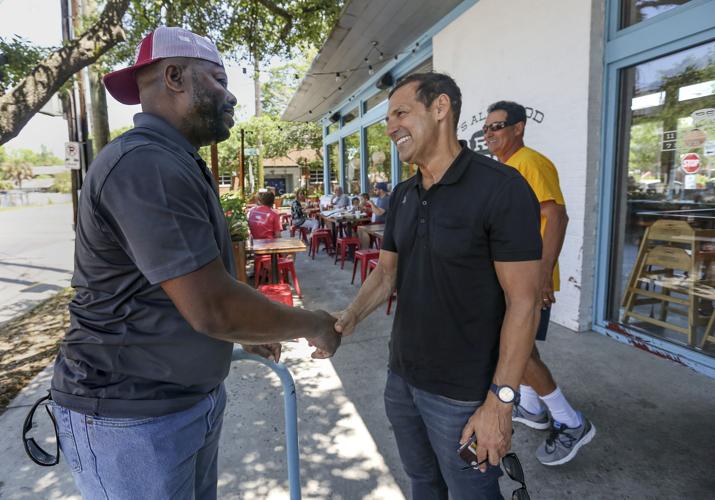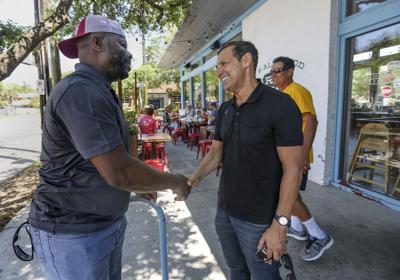Thirty awards were doled out at the inaugural James Beard Awards ceremony, held in New York City on a large vessel named the MS New Yorker.
Dubbed the “food Oscars” by esteemed food critic Ruth Reichl, the May 1991 ceremony was “the largest gathering of American chefs, restaurateurs, winemakers and cookbook authors ever assembled in one place,” she wrote in a recap for the Los Angeles Times.
California had a strong showing that year, with all three Best Chef nominees hailing from the Golden State. Chefs in attendance weren’t there just to enjoy the festivities — a dozen of them were assigned the task of catering the 1,000-person event.
“It is safe to say that no awards banquet anywhere has ever had such wonderful food,” Reichl wrote, commenting on bites like Emeril Lagasse’s Louisiana crawfish étouffée.
The James Beard Foundation, founded in 1985 by a group led by Julia Child, cannot confirm whether any South Carolina chefs were in attendance that night. They do know that South Carolina did not take home a single award.
It wasn’t until 2004 when Louis Osteen of Louis’s on Pawleys Island was awarded Best Chef, that South Carolina would notch its first James Beard Award.
Though the Palmetto State’s nominations have been plentiful over the years, the state has only made it to the podium in the James Beard Foundation’s Restaurant and Chef Awards category nine times since Osteen’s win two decades ago.
Following this year’s semifinalist announcement in January, South Carolina has 11 more chances to take home a James Beard in 2024. As those chefs and restaurateurs await the foundation’s finalist announcement April 3, let’s take a look back at the history of the James Beard Awards.
Choosing the winners
The James Beard Foundation is named after James Beard, considered the “dean of American cookery,” said Dawn Padmore, vice president of awards at the foundation. Beloved by professional chefs, he was a celebrated culinary personality in his era, opening a cooking school and authoring cookbooks that encouraged the appreciation of American cuisine, Padmore said.
The first chef to cook on network television, Beard influenced many prominent figures in food writing, including Child, Madhur Jaffrey and Craig Claiborne. Beard died in 1985.
The James Beard Awards were established in 1990, combining the three most prestigious U.S. food awards at the time: The Who’s Who of American Cooking (launched by Cook’s magazine in 1984), the Food and Beverage Book Awards (started by R.T. French Co. in 1966) and the James Beard Chef Awards (launched by the newly formed James Beard Foundation in 1986).
The inaugural voting body consisted of 220 chefs, journalists, restaurateurs and culinary instructors.

Morgan Calcote and Adam Nemirow of FIG at the James Beard Awards in Chicago.
Thirty-three years later, the James Beard Award’s voting is administered by a 26-person committee team. The administering body leads a large group of judges — the foundation would not say exactly how many — who review nominations, taste food and provide scores before the awards are handed out.
The 2024 ceremony, scheduled for June 10 at The Lyric Opera in Chicago, will be the third year since the James Beard Awards returned in 2022 after two consecutive cancellations, which came as the foundation faced widespread scrutiny.
The 2020 James Beard Awards, postponed to September that year amid the pandemic, were eventually cancelled altogether. Citing the pandemic’s impact on the industry as one reason for its cancellation, awards organizers’ decision came after chefs and media members called on the foundation to make the field of award candidates more diverse.
In 2020, there was not a single Black chef among the 23 winners, according to a New York Times report amid the cancellation. Further investigation discovered that the foundation had asked some chefs to drop out due to concerning personal or professional conduct that came to light over the summer of 2020, according to The New York Times report.
Rather than administer the awards in 2021, the James Beard Foundation conducted an audit, promising that moving forward, the voting body and winners would be more diverse. An independent ethics committee was established to address misconduct, committee and judge terms were shortened, and scoring protocols were updated.
Fee waivers were offered for the foundation’s Broadcast Media and Journalism awards, added over the years along with other categories: Leadership, Books and Restaurant Design, which have all joined the well-known Restaurant and Chef Awards. (Multiple South Carolinians, including cookbook authors Matt and Ted Lee and former Post and Courier food critic Hanna Raskin, have won James Beard Awards in the Media, Journalism and Books categories.)

Jason Stanhope celebrates his James Beard Award.
Taking point of view, experience, race and gender under consideration, the foundation strives to ensure that all voices are represented, said Padmore, who joined the foundation in her current role in 2021. To that end, the foundation set the goal of having people of color make up 50 percent of the committee and judges pool by 2023.
According to the foundation, those diversity, equity and inclusion goals have been exceeded for both committee members and judges as of the 2024 James Beard Awards cycle. The foundation continues to recognize excellence, along with leadership and a commitment to equity and sustainability, Padmore said.
“We took the time during the audit to look at all of the policies and procedures of each program,” Padmore said. “We made a commitment to diversify the voting body across all the programs.”
What’s next?
One of South Carolina’s 10 Restaurant and Chef James Beard Award wins came in February, when Wade’s Restaurant earned the America’s Classics Award for the Southeast region. Given to locally owned restaurants that are “beloved regionally for quality food” and have “timeless appeal,” according to the foundation’s website, Bowens Island Restaurant (2006) and Bertha’s Kitchen (2017) previously took home the legacy award.
There are six America’s Classics Awards for six regions across the country, with this year’s winners joining over 100 U.S. restaurants that have received the award since the category was introduced in 1998.
Before Wade’s, Rodney Scott (Best Chef: Southeast) and FIG (Outstanding Wine Program) were the most recent South Carolina James Beard Award recipients, taking home their awards in 2018.
A James Beard Award gives winners instant notoriety, bringing with it a business boom to chefs and restaurants who take home a medallion. The South Carolina’s semifinalists who moved one step closer to that career-altering win in January will find out if they advance to the finalist stage on April 3.
The last Charleston finalist came in 2022, when Butcher & Bee was among five restaurants nominated in the prestigious Outstanding Restaurant category. Butcher & Bee didn’t win; it permanently closed one year later in 2023.
In 2023, City Grit Hospitality Group and Lula Drake Wine Parlour — a wine bar that earned another semifinalist nod this year — were named James Beard Award finalists.
Though they didn’t win, those two establishments became the first in South Carolina’s capital city to make it to the final stage.














